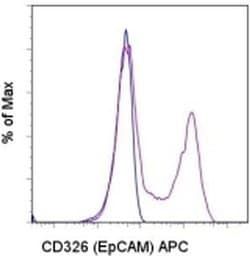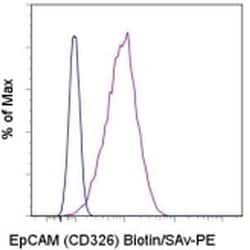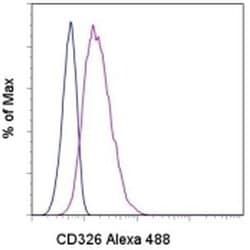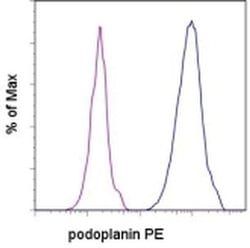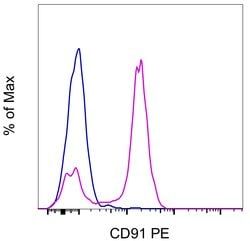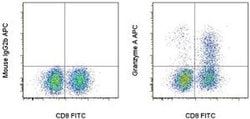CD326 (EpCAM) Monoclonal Antibody (G8.8), FITC, eBioscience™, Invitrogen™
Manufacturer: Fischer Scientific
Select a Size
| Pack Size | SKU | Availability | Price |
|---|---|---|---|
| Each of 1 | 50-112-9240-Each-of-1 | In Stock | ₹ 22,250.00 |
50-112-9240 - Each of 1
In Stock
Quantity
1
Base Price: ₹ 22,250.00
GST (18%): ₹ 4,005.00
Total Price: ₹ 26,255.00
Antigen
CD326 (EpCAM)
Classification
Monoclonal
Concentration
0.5 mg/mL
Formulation
PBS with 0.09% sodium azide; pH 7.2
Gene Accession No.
Q99JW5
Gene Symbols
EPCAM
Purification Method
Affinity chromatography
Regulatory Status
RUO
Gene ID (Entrez)
17075
Content And Storage
4° C, store in dark, DO NOT FREEZE!
Form
Liquid
Applications
Flow Cytometry
Clone
G8.8
Conjugate
FITC
Gene
EPCAM
Gene Alias
adenocarcinoma-associated antigen; CD326; cell surface glycoprotein Trop-1; DIAR5; EGP; EGP-2; EGP314; EGP40; EPCAM; Ep-CAM; EpCAM1; epithelial cell adhesion molecule; Epithelial cell surface antigen; Epithelial glycoprotein; Epithelial glycoprotein 314; ESA; GA733-2; gp40; hEGP314; HNPCC8; human epithelial glycoprotein-2; KS 1/4 antigen; KS1/4; KSA; Ly74; lymphocyte antigen 74; M1S2; M4S1; major gastrointestinal tumor-associated protein GA733-2; mEGP314; membrane component, chromosome 4, surface marker (35kD glycoprotein); MIC18; MK-1; panepithelial glycoprotein 314; protein 289A; Protein D5.7A; Tacsd1; Tacstd1; TROP1; Trop-1 protein; Tumor-associated calcium signal transducer 1
Host Species
Rat
Quantity
100 μg
Primary or Secondary
Primary
Target Species
Mouse
Product Type
Antibody
Isotype
IgG2a κ
Description
- Description: The G8.8 monoclonal antibody reacts with the 40 kDa protein mouse EpCAM (epithelial cellular adhesion molecule), also known as EGP40 (epithelial glycoprotein 40), 17-1A antigen, TACSTD1 (tumor-associated calcium signal transducer 1), and CD326
- The immunogen used to generate the G8.8 antibody was the TE-71 thymic epithelial cell line
- CD326 is expressed on the majority of epithelial cells, and is considered a pan-carcinoma antigen
- CD326 mediates calcium-independent, homophilic, cell-cell adhesion and may function as a growth factor receptor
- The antigen is being used as a target for immunotherapy treatment of human carcinomas
- CD326 binds LAIR-1 (CD305) and LAIR-2 (CD306) to inhibit cellular activation and inflammation
- This epithelial glycoprotein is now recognized as having an important role in tumor biology
- Applications Reported: This G8.8 antibody has been reported for use in flow cytometric analysis
- Applications Tested: This G8.8 antibody has been tested by flow cytometric analysis of the TE-71 cell line
- This can be used at less than or equal to 0.5 μg per test
- A test is defined as the amount (μg) of antibody that will stain a cell sample in a final volume of 100 μL
- Cell number should be determined empirically but can range from 10^5 to 10^8 cells/test
- It is recommended that the antibody be carefully titrated for optimal performance in the assay of interest
- Ep-CAM (epithelial adhesion molecule, epithelial specific antigen, ESA) is a transmembrane glycoprotein expressed in the epithelium with a molecular weight of approximately 40 kDa, which functions as an epithelial cell adhesion molecule
- Ep-CAM functions as a homotypic calcium-independent cell adhesion molecule, and has a direct impact on cell cycle, proliferation and metabolism of epithelial cells and fibroblasts due to its ability to rapidly induce the proto-oncogene c-myc and the cell cycle regulating genes cyclin A and E
- Ep-CAM mediates Ca2+-independent homotypic interactions
- Formation of Ep-CAM-mediated adhesions have a negative regulatory effect on adhesions mediated by classic cadherins, which may have strong effects on the differentiation and growth of epithelial cells
- Ep-CAM overexpression was suggested to be associated with enhanced epithelial proliferation
- Ep-CAM is highly expressed in human carcinomas, and is a marker for tumors of epithelial lineage
- Ep-CAM is expressed on baso-lateral cell surface in most simple epithelia and many carcinoma types
- Also, Ep-CAM reportedly distinguishes adenocarcinomas from pleural mesotheliomas.
